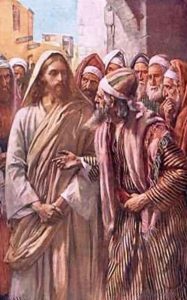The name of the Messiah is Yeshua, a common alternative of the name Yehoshua (יהושע), which means ‘Yah is salvation’ [Matthew 1:21]

Mark 7:19 18 And He said to them,“Are you also without understanding? Do you not perceive that whatever enters a man from outside is unable to defile him, 19 because it does not enter his heart but his stomach, and is eliminated, thus purging all the foods?” [Yeshua’s words in purple] (Words in grey do not occur in any Aramaic manuscripts or in early Greek manuscripts)
Some translations end verse 19 as follows…in saying this Jesus declared all foods clean [NIV].
THE CONTEXT OF MARK 7 AS A WHOLE IS RITUAL PURITY (man-made Oral Law). INTERPRETING MARK 7:19 TO MEAN THAT YESHUA DID AWAY WITH THE FOOD LAWS WOULD DISQUALIFY HIM AS THE MESSIAH OF YISRA'EL
(See the qualifications of a true prophet in Deuteronomy 13:1-5. Note that one of the marks of a false prophet is that he/she would teach The Eternal’s people to depart from the way in which He commanded them to walk.)
The Pharisees believed (man-made traditions of the elders or Oral Law) that hands, bowls, plates, utensils and even dining couches could become ‘common’ through ordinary use and had to be washed (see Acts 10:28). Thus we can think of ‘commonness’ as a higher level of defilement that went beyond what the Eternal had instructed in the Law. They were elevating their traditions to the status of the commandments given by the Eternal.
an evil heart brings forth evil thoughts, fornications, etc.…these are the things that make a person common-not eating bread with unwashed hands.
Note: the subject of Mark 7:19 is what makes a person common NOT unclean.
Matthew 15:17.
17 “Do you not understand that whatever enters into the mouth goes into the stomach, and is cast out to the sewer?"
Literal word for word of the Greek text:
(Strong’s 3754)–because; (S3756)–not; (S1531)–enter; (S846)–him; (S1519)–into; (S3588)–the;
(S2836)–belly; (S2532)–and; (S1519)–into; (S3588)–the; (S856)–latrine; (S1607)–goes out;
(S2511)–purging; (S3956)–all; (S3588)–the; (1033)–food.
A more literal translation of Mark 7:18-19 would read:
Mark 7:18-19
18 And He said to them “Then are you without understanding? Do you not see that whatever goes into a person from outside cannot make him common{Ritually unclean}
19 since it enters not his heart but his belly, and goes into the latrine, purging all foods?"
Unless otherwise noted, all Scriptures was taken from The Scriptures
Copyright by Institute for Scripture Research.
Used by permission.